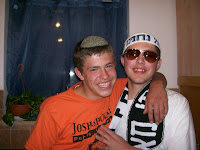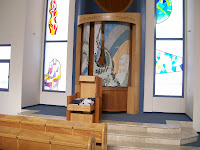Yom rishon, 20 Tishrei 5769.

Isn't it lovely?
Our first sukkah in Eretz Yisrael! I am so proud of it. The sukkah has always been my favorite home, because it is built with love, ingenuity, and creativity by my husband and sons. And because it seems to become imbued with something special and holy. And because it is not belabored by all the flotsom and jetsom of "too-muchness"... It's hard to explain. But if you have had the experience, you know the feeling. Is it the simplicity of it? The closeness? The family project? Or do the
ushpezin, the holy guests, actually add some spiritual dimension that brings us closer to our Father in Shomayim? We are too small to comprehend it... but Hashem blesses us by letting us experience it.
I am always delighted by the way The Dearly Beloved accepts the suggestions and efforts of his sons. And he gets back as good as he gives. I overheard The Stunt Man telling one of his friends: "My Abba is a genius. Did you see that shower curtain? What an idea!" (Mental note, filed under "Keeping the Chagim Special for the Kids": Remember a shower curtain for next year's sukkah.)
The engineering to keep this sukkah upright for the whole chag is trickier than in Baltimore. The winds of Neve Daniel have been measured at at least as strong as 120 kph (sustained) with gusts as high as 185.5. That can really mess with your sukkah! So the guys came up with clever methods for keeping the schach attached to the top of the sukkah, and the walls attached to the frame.
This partial spiderweb design really impressed me. Especially since father and son each contributed ideas to the design, and praised each other's suggestions. These are the very sweet pearls we hope to cull from the bumpy, ugly oysters of the teenage years. They remind us that after parents and children finish the requisite head-butting, there can be a wonderful relationship of mutual respect.
I was in a sukkah this evening, playing music and sharing seemingly vast quantities of food, all in honor of the
Simchat Beit HaShoeva. A very gifted teacher we know was sharing her sukkah with her (finding-themselves-Jewishly) students and with us. She opened up a question-and-answer period, wherein she bravely offered her students the opportunity to ask any questions they wished. One of the questions gave her the opportunity to share with her students why she had chosen this particular (religious) path in life. B'kitzur, she -- a non-religious 17-year-old Jewess -- spent Shabbat with a frum family. She was fascinated by the way the family interacted at the table, as if the Shabbat were the hub of a wheel, and they were its spokes. (In her very lovely secular family, the dinner conversations were isolated islands: her parents talked of the day's events, and of their worries; the kids talked of events in school, and other kids they mutually knew; the parents and kids talked of grades and individual issues...) In this frum family, it seemed there were two common themes -- the parsha hashevua, and the holy Shabbat -- and everyone contributed to the main concepts; and they sang, and told stories, all in support of the main theme of this Shabbat, and all interacting with each other.
She decided then and there that she would one day raise a "connected" Jewish family.
When my husband and son, very normal in the scheme of fathers-and-teenage-sons, have a meeting of the minds over the sukkah -- I feel like that woman. I know that, after all is said and done, they will have a deep respect for one another, born of this exercise of working out the sukkah together. Even as I enjoy these days, with all of their quite normal strife, I am heartened. I know that one day, these two men will be friends, who deeply respect one another.
This is the beautiful subtlety of Judaism.
And then, after all the work, comes beautiful, well-earned play, celebration... the precious celebration of Jewish talent and Jewish desire to please the Creator.
One of my favorite moments in the liturgy comes at Modim d'Rabbanin:
"We thank You for inspiring us to thank You."
What can I say? "Hodu Lashem, ki Tov, ki Le'Olam Chasdo..."

































